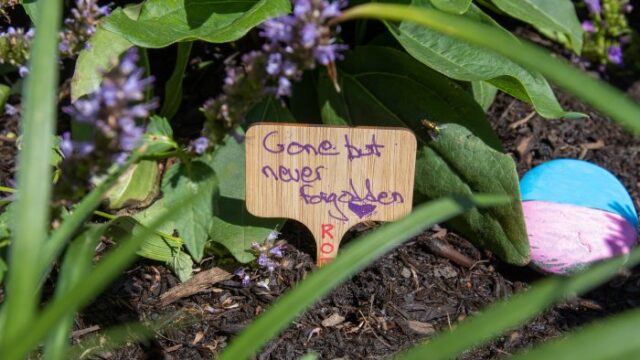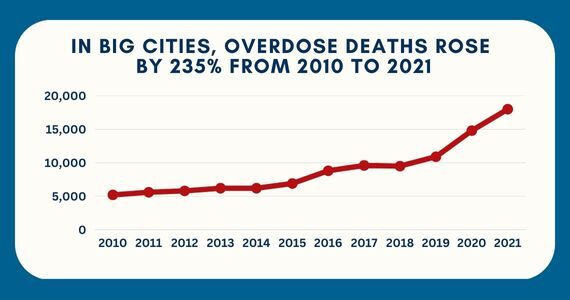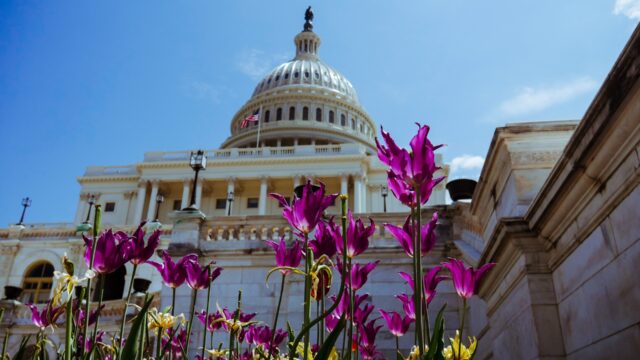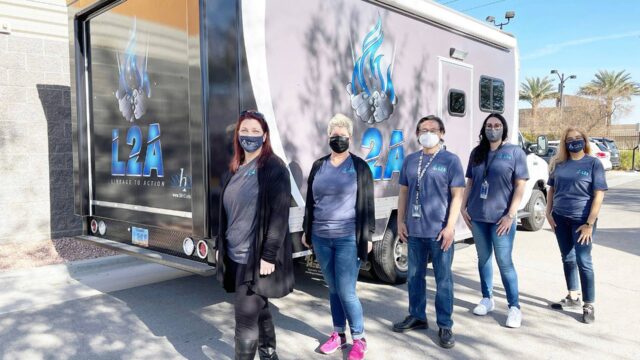Frontline Blog
Philadelphia’s response to the drug overdose crisis
May 2023

The overdose crisis in Philadelphia is a public health emergency. In 2021, the city lost 1,276 people to unintentional fatal overdose, a 5% increase from the previous year.
In April, Philadelphia’s Opioid Response Unit released its latest action plan, updating the city’s progress and outlining its latest efforts across departments to address the overdose crisis in Philadelphia. The progress the city has made, and its plans for the future, serve as a model for other parts of the country wrestling with the opioid epidemic.
An overview of the overdose crisis in Philadelphia
Philadelphia’s 2023 plan to respond to the overdose crisis
Preventing overdoses and reducing harms associated with substance misuse
The city plans to move beyond a one-size-fits-all approach to prevention by expanding targeted, culturally affirming community engagement efforts citywide and working with community partners to reduce stigma around harm reduction and evidence-based treatment. The city will also partner with businesses, schools, places of worship, and community-based organizations to promote community-specific messaging and reach residents who do not identify as people who use opioids or stimulants.
Engaging and supporting impacted communities
In addition to investing $3.5M in community-based efforts through the Overdose Prevention and Community Healing Fund and the Kensington Community Resilience Fund, the city will increase the number of permanent and supportive low-barrier Housing First opportunities available to support people experiencing homelessness at different stages of recovery.
The city will launch mobile methadone citywide, making life-saving treatment for substance use disorder available on the street, and will also ensure people who are incarcerated have the resources to effectively treat their illness.
Expanding access to behavioral health treatment and recovery services
Medications for opioid use disorder (MOUD) such as methadone are the gold standard for treatment in Pennsylvania. The Department of Behavioral Health and Intellectual disAbility Services (DBHIDS) will expand access to MOUD by launching mobile methadone citywide, making life-saving treatment for substance use disorder available on the street. People who are incarcerated are also at high risk for overdose. DBHIDS will expand access to MOUD in Philadelphia prisons, ensuring people who are incarcerated have the resources to effectively treat their illness.
Ensuring public safety by reducing drug market activity
In partnership with local, state, and federal law enforcement agencies and the National Network for Safe Communities, the city is working to disrupt the open-air drug markets in Kensington through Drug Market Intervention (DMI). First piloted in High Point, North Carolina in 2002, the DMI strategy has successfully closed open-air drug markets nationwide and has been found to significantly reduce violent and drug-related crime.
How Philadelphia made progress in 2022
Distributing vital resources to residents
Naloxone is a life-saving medication that can reverse an opioid overdose within minutes. In 2022, the Philadelphia Department of Public Health (PDPH) distributed 54,036 doses of naloxone to communities and installed the first Naloxone Near Me Tower, a 24/7 vending machine that dispenses free naloxone to residents, in West Philadelphia.
Improving access to treatment and housing
The Office of Homeless Services (OHS) and DBHIDS worked together to streamline services and break down system barriers by completing a 100-Day Challenge in Kensington that resulted in more than 400 people accessing housing and treatment services within 100 days.
Providing mobile wound care
DBHIDS piloted the first licensed mobile wound care van in Pennsylvania in response to xylazine and treated 1,254 patients for severe wounds, a common barrier to accessing treatment and housing. DBHIDS also expanded mobile outreach teams citywide to support adults experiencing a behavioral health crisis and promote alternative diversions.
Supporting grieving families
PDPH expanded bereavement care to support families who have lost loved ones to substance misuse and launched the first pop-up Overdose Memorial Garden in Center City in August 2022.
Strengthening community-based efforts
ORU launched the Overdose Prevention and Community Healing Fund, a $3.5M grantmaking program that mobilizes community-based organizations as trusted community messengers to bring prevention resources to impacted communities.
Offering same day pay for work
MDO-Community Services created 4,177 work opportunities for sheltered and unsheltered residents through Same Day Work Pay, a low-barrier, temporary employment program.
Investing in communities
The City of Philadelphia secured its share of the nationwide opioid settlements and will receive about $200M to support a wide range of crisis response strategies over the next 18 years. In January 2023, the City announced $20 million in initial investments from the opioid settlement to fund several initiatives in the 2023 Overdose Response Action Plan.
About the Opioid Response Unit
Established in February 2020, the Opioid Response Unit (ORU) is a permanent unit within the Managing Director’s Office that ensures that City departments are operating under a unified strategy in response to the overdose crisis in Philadelphia.
The ORU works across departments to expand the prevention and treatment of substance use disorder, while helping impacted communities recover through coordinated efforts in community support and public safety. The ORU also collaborates with residents, providers, and community partners to mobilize a community-based response and support impacted areas.
Learn more at phila.gov/opioids.


